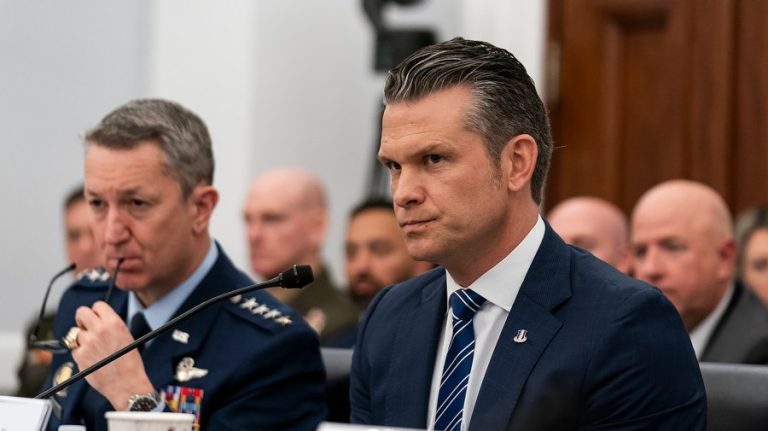Some Democrats are accusing Defense Secretary Pete Hegseth of curtailing Congress’ oversight role with his recent order instructing the Defense Department personnel to coordinate all interactions with Capitol Hill through the building’s central legislative affairs office.
Hegseth and his deputy, Steve Feinberg, said in an Oct. 15 memo that DOD officials have to get permission from the department’s main legislative affairs office before communicating with lawmakers or congressional aides, a policy that lawmakers fear will curb the flow of information from the Pentagon to Capitol Hill.
“Unauthorized engagements with Congress by [Defense Department] personnel acting in their official capacity, no matter how well-intentioned, may undermine Department-wide priorities critical to achieving our legislative objectives,” Hegseth and Feinberg said in the 3-page memo.
The directive applies to the chairman of the Joint Chiefs of Staff and the Joint Staff, senior department leaders, services secretaries, combatant command heads, directors of DOD agencies, legislative analysts, congressional affairs officials, and others within the department. The memo excludes DOD’s inspectors generals office.
Some Senate Democrats hammered Hegseth over the latest memo, arguing it would impede on their duty of performing oversight — and might be illegal.
“It is directly contradictory to congressional oversight and it invites a confrontation with Congress. I don’t know how any of us can accept that kind of limitation on the scrutiny that the Pentagon needs and deserves,” Sen. Richard Blumenthal (D-Conn.), who sits on the Senate Armed Services panel, told The Hill on Thursday.
“Because a trillion dollars of taxpayer money, is an investment the American people are making there, and they deserve oversight,” Blumenthal added of the Pentagon’s massive budget. “The memo is, in my view, an improper and perhaps illegal constraint.”
Rep. Adam Smith (D-Wash.), the top Democrat on the House Armed Services Committee, said he is “deeply” concerned about the memo, saying it “signals the administration’s intent to further restrict communication with Congress and impede this committee’s access to detailed information in a timely manner.”
Smith, who has criticized Hegseth’s leadership at the Pentagon and raised concerns about the U.S. military’s strikes against alleged drug-trafficking boats in the Caribbean, argued the Trump administration continues to be the “least transparent with or responsive to Congress.”
“Since January, it has been difficult, and at times impossible, to get answers to even the most basic questions submitted by this committee. We have a constitutional responsibility to conduct oversight,” Smith said in a statement on Thursday.
“They must immediately return to working with our committee in a collaborative and bipartisan manner for the sake of our national security, national defense, constitutional Republic, and to provide transparency for the American people.”
Requests for information, technical assistance and legislative correspondence and other communication with Congress also have to be coordinated with the Office of the Assistant Secretary of War (OASW) for Legislative Affairs office, according to the memo.
The order marks a shift as previously military branches and DOD agencies were permitted to handle their own communication with Capitol Hill.
The Pentagon defended the memo, saying it is a “pragmatic step to internally review” DOD’s “processes” for communicating with Congress.
“The Department intends to improve accuracy and responsiveness in communicating with the Congress to facilitate increased transparency,” Sean Parnell, the chief DOD spokesperson, said in a Thursday statement to The Hill. “This review is for processes internal to the Department and does not change how or from whom Congress receives information.”
The memo clarifies that DOD employees still have whistleblower protections and other rights granted by law to communicate with Congress. And it says the DOD comptroller will continue to “serve as the principal legislative liaison for the appropriations committees and the Congressional Budget Office in direct coordination with OASW.”
The Pentagon’s general counsel role and authority have not changed, according to the memo.
Sen. Angus King (I-Maine), another lawmaker who sits on the Senate Armed Services Commitee, ripped the memo on Thursday and argued it will hamper Congress’s ability to perform oversight.
“Yes, as a member of the armed services and intelligence committee, we’re in touch with the people of the Pentagon all the time,” King told reporters at the Capitol on Thursday when asked if he was worried about the memo. “And I don’t, I don’t understand it, and I don’t like it.”
Hegseth and Feinberg have directed the Pentagon’s assistant secretary of legislative affairs to perform an overview of DOD’s communications with Capitol Hill, which is expected to be complete in 90 days.
In a second memo, which was authored on Oct. 17, Hegseth and Feinberg directed a “working group to further define the guidance on legislative engagements.”
When reached for comment, the office of Sen. Roger Wicker (R-Miss.), the chair of the Senate Armed Services Commitee, declined to comment on the Oct. 15 memo.
The move to restrict communication with Congress comes in the wake of an exodus of mainstream media from the Pentagon’s press corps after Hegseth implemented a new policy requiring the department’s approval for reporting on non-public information.

